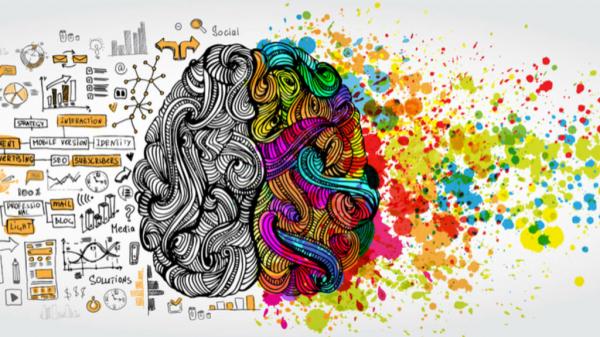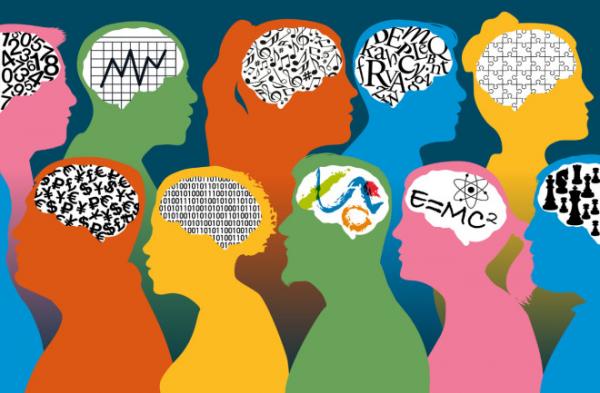All about abstract thinking and ways to strengthen it

 Abstract thinking
Abstract thinkingToday's life confronts us with a large amount of data, which is collected and classified in different areas, one of them Abstract thinking Is. Abstract thinking is the ability to understand real concepts, such as freedom or vulnerability, things that are not directly related to the objects and experiences of the real and concrete world.
What is abstract thinking?
In today's world, data is very important, so professionals in every industry are looking for innovative ways to measure and visualize data on a daily basis. It should be noted that data has almost no value unless you can look at the numbers and identify patterns, then analyze the meaning of these patterns and prepare a report that can be explained to other people. The difference between collecting data and understanding their meaning is actually the difference between objective thinking and abstract thinking. To answer the question of abstract thinking, it can be explained as follows:
Abstract thinking is the ability of people to understand real concepts such as freedom or vulnerability that do not directly deal with objects, tangible physical experiences. This thinking demonstrates the ability to acquire information through our senses and communicate with the wider world.
One of the good examples of abstract thinking in the workplace is humor. Comedians are experts in this matter, they can observe the world around them, find contradictions, injustices and then make fun of relationships that we don't expect. In the following, we discuss how to use abstract thinking and its features.
Advantages of abstract thinking over other thinking:
In 2006, a study was conducted at the University of Amsterdam, which showed that people feel more empowered when they think abstractly, which is precisely why abstract thinking is sometimes preferable to concrete thinking because concrete thinking will be more limited.
What is the use of abstract thinking?
From the point of view of psychology, abstract thinking means the ability to understand basic and common characteristics. It is used for keeping different aspects of a situation in mind, planning for the future and forecasting, symbolic thinking and drawing conclusions. Abstract thinking is opposed to concrete or objective thinking because objective thinking relies on the current time and place.
 Applications of abstract thinking
Applications of abstract thinkingWhat is abstract thinking good for?
Abstract thinking helps a lot to communicate between ideas, opinions or different external and internal elements, in addition to this, it will also help innovation, creativity, imagination and new ideas.
On the other hand, abstract thinking can provide cognition, and one of the last human cognitive abilities that is acquired at the evolutionary level will be obtained through abstract thinking.
Features of abstract thinking:
These characteristics focus on the content, form and functions of abstract thinking, and in summary, it can be said that abstract thinking brings the following:
– Focus on elements that go beyond the current environment.
– You can use it to use your imagination and innovation and be creative.
– Stimulation of deep thinking about the subject
– Finding different meanings in different situations
– Abstract thinking is a type of hypothetical-deductive thinking that allows people to make hypotheses without the need for experimental testing.
– This type of thinking is flexible so that it can cause discussion in any field.
The difference between abstract thinking and objective thinking:
Abstract thinking is often opposed to objective thinking in the sense that abstract thinking has a definition that is in conflict with objective thinking. Objective thinking is closely related to objects and experiences. For example, when we have a project with specified steps and a certain time order, we have actually considered an objective thinking. In this regard, abstract thinking is understanding the reasons that make the project more important. Many of us need to use a combination of concrete and abstract thinking to be more successful in our daily lives.
 Abstract thinking and its difference with objective thinking
Abstract thinking and its difference with objective thinkingDeveloping the ability to think abstractly:
Abstract thinking will improve when our experience increases, Jean Piaget is a Swiss psychologist who mentions the change in children's thinking ability over time with growth.
Piaget believes that children think objectively from birth to about 2 years old, they observe and examine the world around them using their five senses and motor skills. For example, pick up candy from the floor, put it in your mouth, do you like it or not? Repeat these steps.
From 2 to 7 years old is the time when children learn symbolic thinking and the foundation of abstract thinking may be formed from the same time. They learn symbols such as letters, pictures, and sounds that represent real objects in the real world.
From ages 7 to 11, they develop their logical reasoning, but their thinking will still be largely objective with regard to the subjects they directly represent.
In some cases, almost at the age of 12 and continuing the path of adulthood, most people build their logical reasoning and expand it using abstract thinking.
This stage actually leads to the development of this skill to put themselves in the place of others to learn empathy, if we want to use metaphors of abstract thinking. In fact, practicing empathy can be considered as the ability to think abstractly.
Ways to improve abstract thinking:
If we want to improve our abstract thinking skills, we should refer to a series of simple methods, some of which will be mentioned below:
Improvisation: If there are theater groups around you, you can take workshops with them and allow yourself to explore the shape of unlimited components well.
Puzzle solving: 3D visual puzzles and words will teach you that you can think of alternatives to what happens to you at that moment.
Making 3D models: Based on studies, people who are experienced in the fields of science, technology, engineering and mathematics can improve their abstract thinking ability by doing industrial art projects.
Using vision errors: Some researchers use art and photos with vision errors to teach people to see things differently. Paying attention to things from different points of view will be a characteristic of abstract thinking.
Playing with allusions: This thinking can be enhanced by writing similes, metaphors, allegories, and even a part of life giving. Think about a topic in real terms and relate it to something abstract. For example, “on the day he was sentenced, it was raining a little; It is as if justice is crying.” Or “Psychologist Makes Sexist Comment By Saying Women's Brains Are Like Plates Of Spaghetti.”
 Ways to improve abstract thinking
Ways to improve abstract thinkingLimiters of abstract thinking:
Certain neurological conditions can impair your ability to think abstractly. For example, the following will limit abstract thinking:
Autism Spectrum Disorder: Researchers know that some people who suffer from autism spectrum disorders may have difficulty understanding concepts and solving problems.
Schizophrenia: Some forms of abstract thinking, especially those involving understanding social situations, will be limited due to schizophrenia.
Impulsive or natural brain injuries: injuries that occur as a result of prenatal brain events such as fetal alcohol spectrum disorders or after birth can affect the parts of the brain that are responsible for abstract thinking.
Intellectual disabilities: People with intellectual disabilities often have difficulty using abstract thinking skills as well as understanding them.
Dementia: Often, the parts of the brain that are damaged in the process of dementia are the same parts that are responsible for abstract thinking skills.
When does abstract thinking not help?
Sometimes the ability to imagine, predict and communicate in a healthy body may be impaired, in this case abstract thinking will not help much.
For example, if you consider a cognitive disorder such as catastrophizing, you will habitually imagine the worst scenarios, in which case your anxiety may increase and the symptoms of depression will appear with a worse intensity.
Another example of this is overgeneralization, if the experience of failure is considered to prove this point, you will always face failure, in which case you will get an incorrect and unexpected result from the generalization. According to a reliable research, this type of abstraction is common between anxiety and depression.
If you have one of the following conditions, abstract thinking may cause you problems:
– anxiety;
– Depression;
– Obsessive Compulsive Disorder;
Post-traumatic stress disorder
Despite this, researchers have found that practicing objective thinking skills and using them to improve depression symptoms can even be used to help with decision making during depression.
 Limiters of abstract thinking
Limiters of abstract thinkingHow to use abstract thinking:
Abstract thinking can be used in fields such as mathematics and science because analytical reasoning requires the use of abstract thinking. You must not forget that in order to understand this subject or knowledge, you must be able to relate it to your real life to make it practical.
Conclusion:
As mentioned, abstract thinking is the ability to understand concepts higher than what can be seen physically and includes identifying patterns, analyzing ideas, combining information, solving problems and making objects.
When people become more established, the ability to think abstractly will improve and we can consciously express it through improvisation, games, puzzles and models.
Establishing a correct balance between objective and abstract thinking will protect mental health and daily functioning.
This thinking would be the ability to understand real concepts such as freedom or vulnerability that do not directly deal with tangible physical objects and experiences.
Many of the tasks that students have in school are related to abstract reasoning, math skills are usually abstract thinking that will increase with experience.
Certain neurological conditions such as autism disorders, dementia, and mental retardation may interfere with your ability to think abstractly.
compilation: Department of psychology cover






